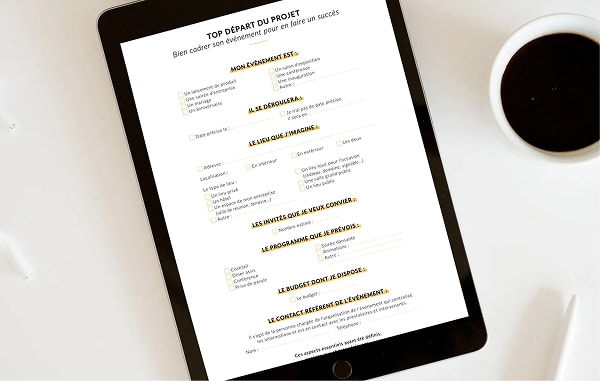Artificial intelligence (AI) is becoming an essential player in many sectors, and the event industry is no exception. Its impact on event organization, especially professional events, is increasingly noticeable. In this article, we explore how AI can help you to organize a seminar.
1. Planning and optimizing logistical management with AI
Automating the search for venues and providers
Finding the ideal venue and the best providers can be a long and complex process. Thanks to AI, this task becomes faster and more efficient. By analyzing vast databases and leveraging machine learning algorithms, AI can recommend venues suited to the specific needs of the event : capacity, location, technical infrastructure, etc. Likewise, it can suggest the most qualified providers based on customer reviews, availability, and budget.
Optimizing costs and budget management with AI
Artificial intelligence also plays a key role in the financial optimization of events. It can analyze past expenses and provide accurate forecasts to maximize return on investment. By identifying the most profitable expense categories and suggesting more cost-effective alternatives, AI helps organizers manage their budgets more strategically while ensuring the event's quality.
Organizing schedules and managing time
A successful event relies on meticulous organization and strict deadline management. AI tools allow the creation of dynamic schedules that adapt to unforeseen circumstances and send alerts in case of delays. This enables organizers to track task progress in real time and optimize team coordination.

2. Personalizing the customer experience
Creating a tailored program
Each participant attends a seminar with specific expectations : conferences, networking, demonstrations… AI makes it possible to personalize the program based on individual preferences and past behaviors. By analyzing visitors' interests, AI can recommend sessions, booths, or speakers that might interest them, thereby improving their satisfaction and engagement.
Real-time automatic translation and content accessibility
AI also makes events more accessible by breaking down language barriers. Automatic translation tools allow international participants to follow conferences in real time in their native language. Additionally, live captioning and transcription solutions make content accessible to hearing-impaired individuals, promoting greater inclusivity.
👉 Also read : Company seminar - why and how to organize a seminar ?
3. Boosting conferences and workshops with AI
Content generation and enhanced presentations
AI facilitates the production and distribution of content throughout the event. It can generate conference summaries, provide real-time syntheses, and make keynotes available to participants. Chatbots and virtual assistants can also answer visitors’ questions and provide personalized information within seconds.
Analyzing interactions and real-time feedback
AI enables real-time analysis of participant engagement during conferences and workshops. By assessing reactions, questions asked, or time spent on a session, organizers can adjust content based on audience expectations. This real-time feedback helps optimize the impact of presentations and improve the quality of discussions.
Intelligent networking for seminar attendees
Networking is an essential component of seminars. AI facilitates these connections by identifying participants with common interests and suggesting relevant meetings. Using matchmaking algorithms, visitors can optimize their time on-site by engaging with the right people, thus enhancing the effectiveness of professional interactions.

4. Post-seminar performance monitoring and analysis
Data analysis and return on investment
AI remains valuable even after the event has ended. It allows the analysis of collected data throughout the seminar, whether it be participant numbers, the most attended sessions, or engagement rates. This information gives organizers a clear view of the event’s impact and helps justify the return on investment for sponsors and partners.
Optimizing future editions with AI insights
By conducting an in-depth analysis of participant behaviors and feedback, AI helps improve future editions. It identifies strengths and areas for improvement based on observed trends, ensuring increasingly successful events that align with audience expectations.
👉 Also read : Marquees for seminars and conferences : create a temporary professional space
5. Best practices and limitations of AI in event management
Choosing the right AI tools
Not all AI tools are created equal, and it is essential for organizers to select those that truly meet their needs. Some platforms specialize in logistical management, while others focus on participant engagement. To make the right choice, it is important to assess features, integration with other software, and ease of use.
Ethics and data protection
The use of AI also raises challenges regarding personal data protection. Organizers must ensure that the selected solutions comply with applicable regulations (such as GDPR) and guarantee the security of participant information. Transparency about data usage is essential to build trust.
The importance of the human factor despite automation
While AI optimizes event organization and participant experience, it does not replace human interaction. Human engagement remains a key element of professional events, especially for hosting conferences, managing unforeseen situations, and fostering relationships. AI should be used as a support tool, not as a substitute for the expertise and creativity of organizers.
Artificial intelligence is transforming the event industry by offering more efficient organization and a tailored experience for participants. From planning to post-event analysis, it optimizes every step and allows organizers to create more interactive, engaging, and profitable seminars. By integrating these technologies, the event sector is entering a new era where innovation and user experience are at the forefront of priorities.
Ile-de-France・Centre-Val de Loire
01 79 75 89 87
Provence-Alpes-Côte d’Azur・Corse
04 84 49 62 64
Nouvelle-Aquitaine
05 35 54 59 88
Hauts-de-France・Normandie
03 74 09 83 62
Bretagne・Pays de la Loire
02 57 64 07 94
Grand-Est・Bourgogne
03 52 74 06 68
Auvergne-Rhône-Alpes
04 28 29 61 35
Occitanie
05 82 95 39 28
Switzerland
+41 076 504 33 02

subtitle
Product name
Discover the Atawa Guide
The Atawa Guide is the new essential tool for organizing your events: from launching your project to bringing it to life, no detail has been overlooked to ensure your event's success.





